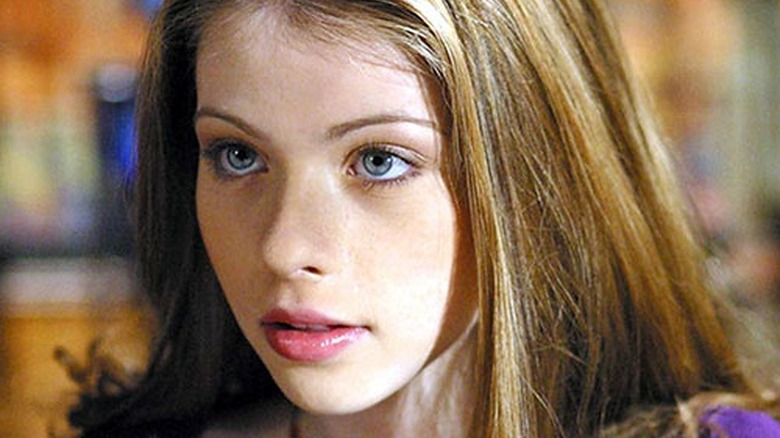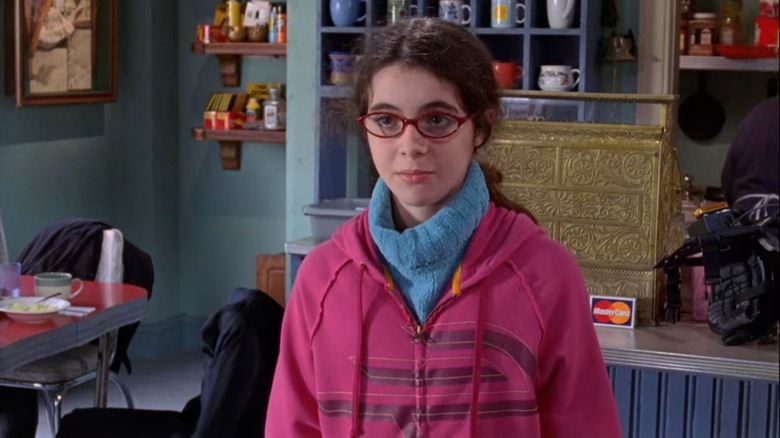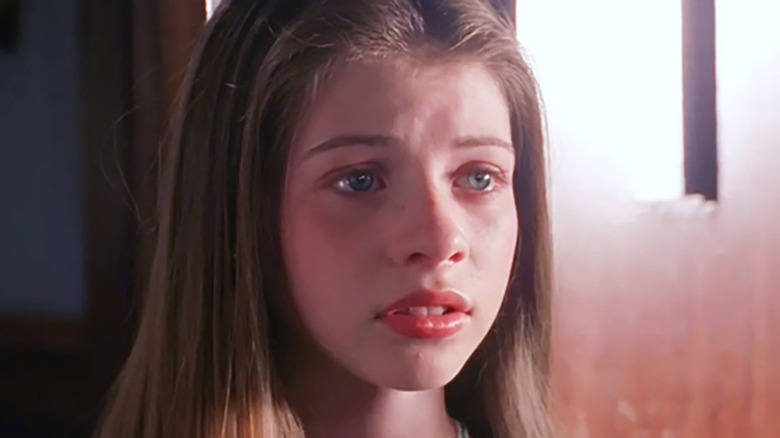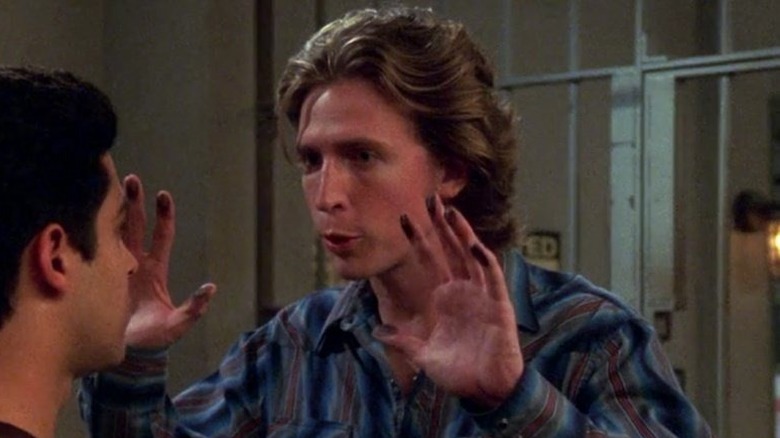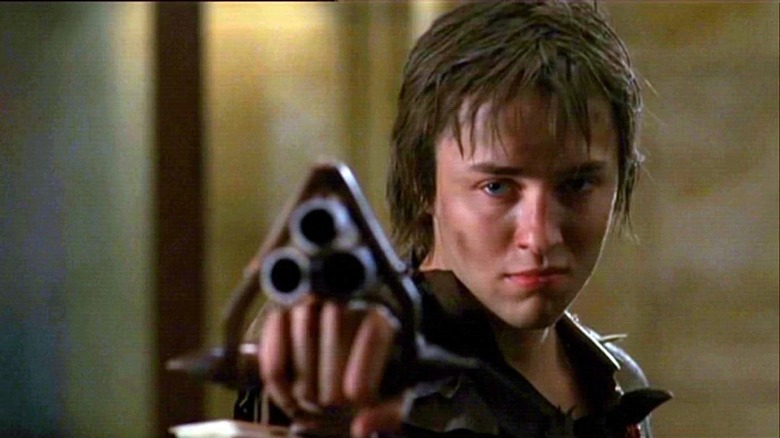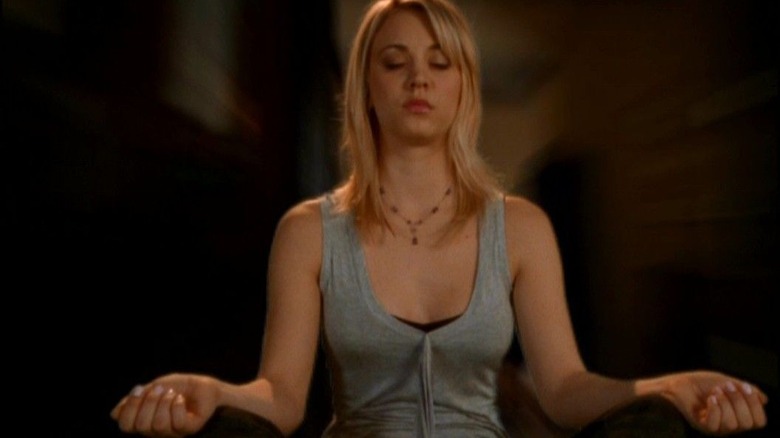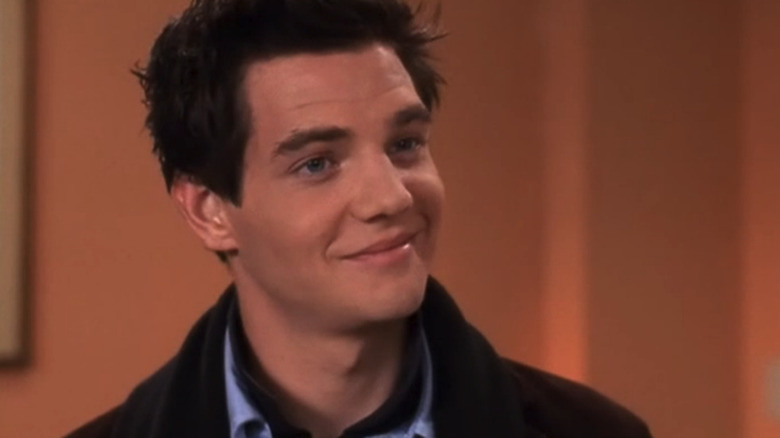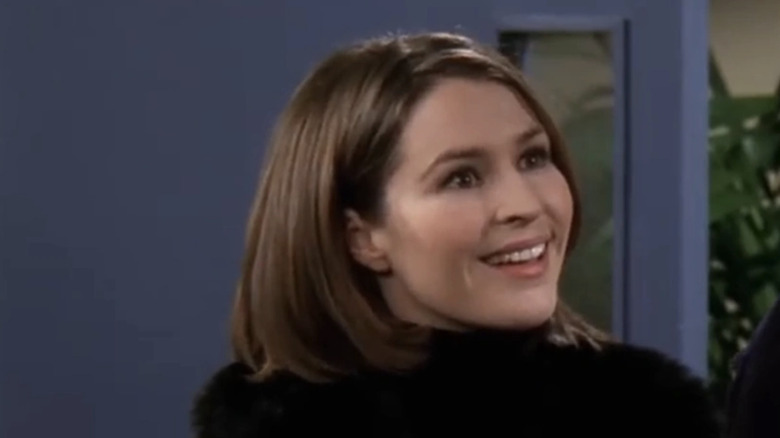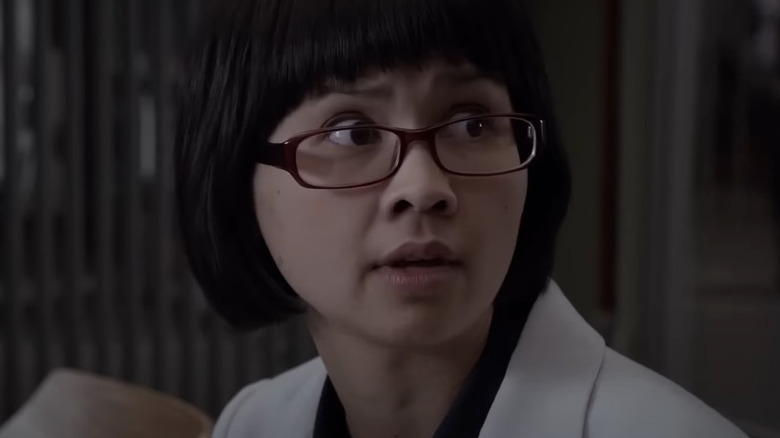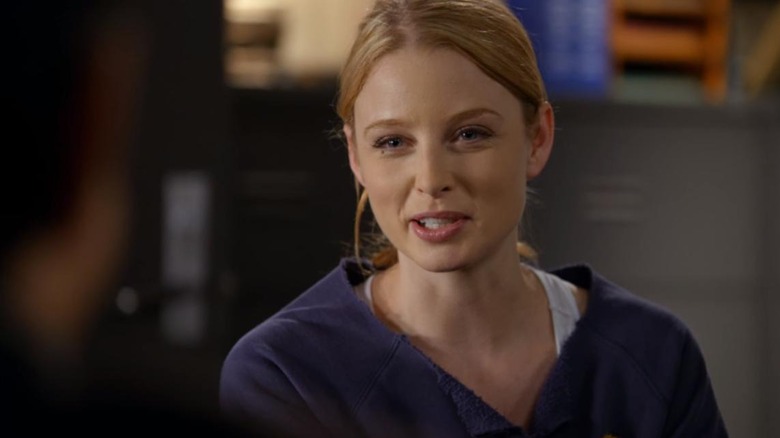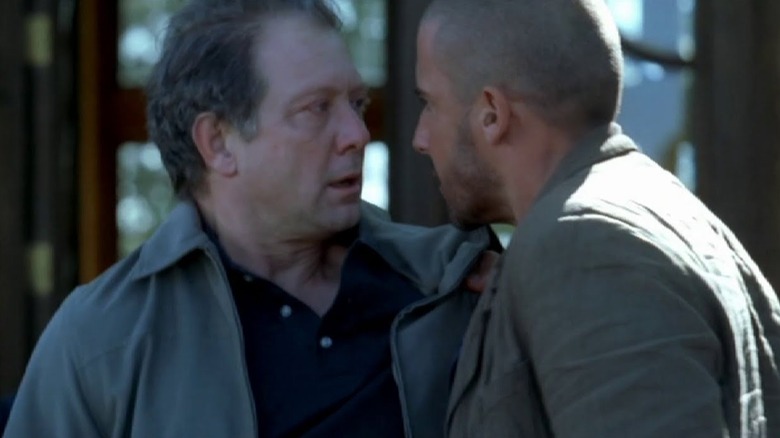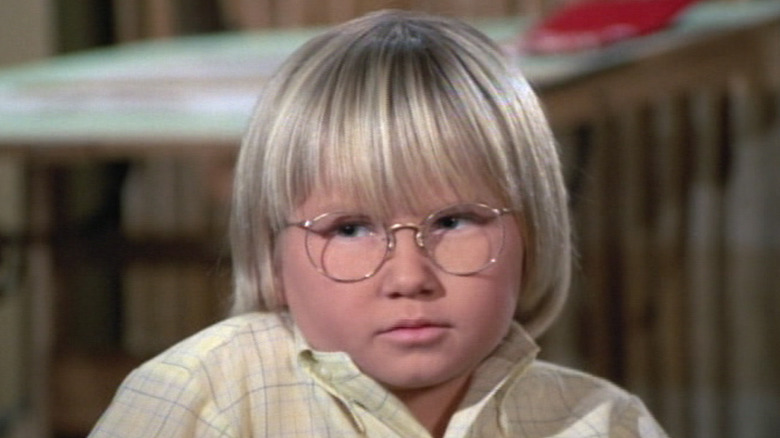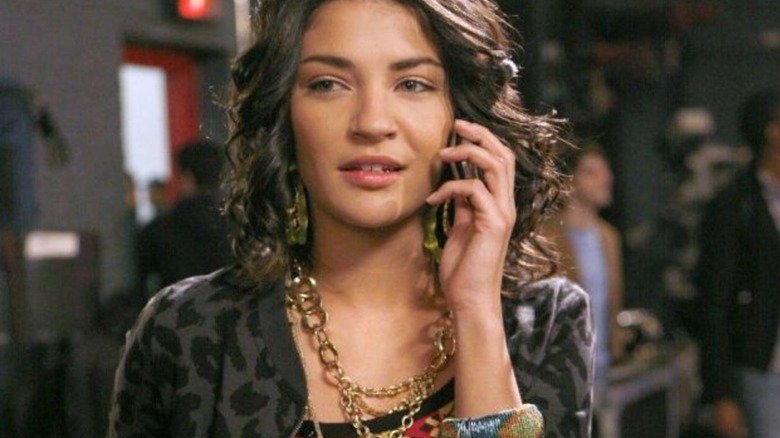The 12 Most Hated Character Additions To Popular TV Shows
It's a tale as old as time, or at least as old as TV — A show struggles and writers scramble to rekindle fan interest by adding in a random character out of nowhere. Yet instead of warming audiences up, these character additions almost always push fans farther away. How many times has a surprise kid turned out to be the kiss of death for a TV show? More than a few.
In most cases, a show ending right after the introduction of a hated character happens because the show is already in trouble. But an additional character is rarely the answer for getting numbers up. "The Brady Bunch" is often cited as the catalyst for this trope, as Cousin Oliver is pretty much the quintessential unnecessary new character of doom. But decades after the five-season show left the air, TV has found new ways to spin this phenomenon. It's not always children, either. Plenty of shows have added adult characters into their lineups that fans have absolutely loathed.
Now, shows can and have survived these kinds of character additions — sometimes, incongruous new characters appear during periods when shows aren't even having issues — yet they still deserve their status as despised additions. Between surprise children, character replacements, and simple bad ideas for new characters, here are some of TV's most fan-hated new characters in beloved TV shows.
Due to the nature of their on-screen storylines, the following article contains mentions of suicide, domestic violence, and sexual assault.
April Nardini: Gilmore Girls
"Gilmore Girls" fans will never forgive April Nardini for dismantling Luke and Lorelai's relationship. The grumpy diner owner and the newly minted inn owner finally get together in Season 4 after years of pining and horrid filler relationships on both sides. Sure, relationships need a shake-up every now and then, but characters don't need to continually break up to retain fan interest. Cue the entrance of Luke's daughter April in Season 6. She stumbles into Luke's Diner with clunky exposition about a science fair and later concludes that Luke is her biological father.
Twelve is an annoying age in general, but April's personality is simply a more irritating version of Lorelai's bookish daughter Rory. Luke understandably wants to get to know his kid, but he's entirely out of character when he hypocritically keeps her a secret from Lorelai for months after hounding her about honesty surrounding her situation with Christopher. Meanwhile, April's mom Anna is even worse, refusing to allow Lorelai into April's life until she's married to Luke despite their engagement. Anna goes on about not wanting April to get attached, yet just one year later, she fights to have Luke's custody taken away for no reason, crushing April in the process.
And to make matters even worse? After Luke and Lorelai break up for a year after Lorelai gives Luke a marriage ultimatum and sleeps with Christopher (ugh), the Netflix revival picks up pretty much where the show leaves off despite taking place a decade later. Luke and Lorelai still aren't married at this point, they don't have the kid they both wanted; before showrunner Amy Sherman-Palladino returns and properly orchestrates their long-overdue emotional journey, Lorelai and Luke basically waste a decade of their lives. Thanks, April.
Dawn Summers: Buffy the Vampire Slayer
There's just something about characters showing up out of nowhere that fans can't stand. In "Buffy the Vampire Slayer," the show teased Buffy's surprise sister Dawn and Buffy's sacrifice for her sister long before her arrival. Buffy has bizarre prophetic dreams where Faith tells Buffy, "Little Ms. Muffet, counting down from seven, three, oh." At the time, it sounds like rambling nonsense; then, Buffy dies 730 days later to save her sister in the Season 5 finale. For some reason, Faith is the one to tease the youngest Summers kid, telling Buffy in another Season 4 fever dream that, "Little sis is coming."
As it turns out, Dawn is a human embodiment of the Key that the villain Glory needs to open the gates to every dimension and jumpstart the apocalypse. The clunky attempt to give Buffy a sister after four years as an only child was bad enough. Yet her arrival is made even worse when Glory feeds on brains, leaving her victims devoid of sanity. For some reason, only those individuals can see Dawn's true essence as the Key. So now, in addition to Dawn being a whiny and mostly useless addition to the Scooby Gang, she's also the origin of a problematic storyline. Just three seasons later, after Buffy sacrifices herself for her energy ball of a sister, Dawn kicks Buffy out of their house. Can we get a refund on mystical Key sisters?
Randy Pearson: That '70s Show
Adding a new character as a clear attempt to replace an old one almost always sets shows up for failure. When actors of beloved characters leave a series, it's best to fill the void with a new dynamic rather than try to recreate the old one. The departure of Topher Grace and Ashton Kutcher left a gaping Eric-and-Kelso-shaped hole in the final season of "That '70s Show," and Randy takes the brunt of the blame.
When Josh Meyers joined the cast in Season 8, fans were quick to blame his character for the show's cancellation. Yet if we're being honest, the series should have made its bow in Season 7 with the departure of Eric, the glue of the group, and Kelso, the comedic relief. It's no surprise that a show about a group of six friends can't sustain itself with two of the core group missing.
Yet instead of bringing in someone entirely new, the minds behind "That '70s Show" scrapped the original plan to recast Eric with Meyers and created the new character Randy — a clumsy and deeply ill-advised attempt to fuse Kelso and Eric's personalities together, even going so far as to throw Donna and Randy together to mimic her chemistry with Eric. Had the show not done a disservice to the OG characters by replacing them, maybe it could have lasted another season or two. Yet this choice really ticked off fans, and it was the final nail in the coffin for "That '70s Show."
Connor: Angel
Oh boy, another surprise kid to fail at shaking things up on a TV show. Did Joss Whedon learn nothing from the near-universal fan hatred of Dawn Summers? Connor shows up midway through Season 3 of "Angel" in an episode titled "Lullaby." It's an ironic name for Conner's debut, as fans lost a ton of sleep thanks to this awful character. Connor's existence defies the "Buffy" universe's rules for vampires; somehow, Darla gets pregnant after sleeping with Angel, who's also a vampire. The concept of magic can only suspend so much disbelief. These bodies cannot procreate; they are both dead.
And just when we thought this storyline can't get any worse, it gets a lot worse! The show establishes that Darla doesn't want to give birth and forces her to have the baby anyway. Darla tries and fails to abort the fetus multiple times, which is pretty gross coming from self-appointed feminist icon Joss Whedon. It's yet another instance in a long line of grievances where the women in his shows have no autonomy over their bodies and personhood. How many times does Cordelia immaculately conceive with creepy creatures throughout "Angel?" Darla eventually stakes herself to protect the child she's forced to have, reducing her to nothing more than a womb.
And because Angel hasn't been tortured enough, apparently, Connor gets kidnapped and taken to Quor'toth where he's raised to hate his father and seek revenge. After awkwardly feuding with the annoying prodigal son, "Angel" fans finally thought they were free of the kid when Angel has his memories wiped to give him a normal suburban life. But it doesn't last. Connor's memories come back, and so does he.
If you or anyone you know is having suicidal thoughts, please call the National Suicide Prevention Lifeline by dialing 988 or by calling 1-800-273-TALK (8255).
Billie Jenkins: Charmed
Three is charming, but four is a crowd if you ask OG "Charmed" fans. The Billie Jenkins addition to the Charmed Ones mix is yet another case of a struggling show trying to revitalize itself. Yet like most last-ditch efforts, it's not a successful attempt. Rather than spending the show's final season on the core group of sisters fans know and love, Billie comes into play in a central arc where she enlists the Charmed Ones' help in finding her sister.
To add insult to injury, Billie has the same power as Prue — an original sister who dies early in the show. If you want to really irritate a fandom, functionally recreating fan-favorite characters is the way to go. And the slights don't stop there. Plenty of fans are still outraged that original series characters like Wyatt only show up for two episodes of the final season. In an interview with TV Line, showrunner Brad Kern attributed Wyatt's absence to budget cuts. He also shot down the rumor that Kaley Cuoco was brought in as Billie for a potential spinoff, but that hasn't stopped fans from blaming Billie for taking away screentime and resources from their favorite characters.
In reality, it seems like budgets wouldn't have allowed for anything else to happen. Cuoco was a relatively new actor, and the show had to do something to fill in the gaps of the many missing characters. In hindsight, maybe the show should have ended with Season 7.
Oliver Trask: The OC
There's nothing like a good, old-fashioned stalker to shake things up in California. Marissa and Ryan can create enough drama for themselves in "The OC" without help from the local stalker, but that didn't stop the writers from adding Oliver into the mix toward the end of Season 1 of the show, which had already amassed a dedicated fan base.
Marissa meets Oliver in therapy, where he begins manipulating her, showering her with gifts, and gaslighting her into spending every waking moment with him. Knowing that Marissa has a bit of a savior complex, Oliver uses it to his advantage until he finally makes a move, and Marissa turns him down. He pulls out a gun in an eyeroll-inducingly typical "If I can't have her, no one can" fashion. Despite the show being relatively new at the time of Oliver's appearance, the hatred from fans was so intense that the series later addresses it in a meta moment in Season 3. Ryan tells Marissa that he wouldn't do anything different, "except maybe Oliver."
The disdain for Oliver hasn't died down over the years, either. Rachel Bilson and Melinda Clarke talked about it during their podcast "Welcome to the O.C., B******!" Adam Brody said in "The Strip" episode of the podcast that Oliver is one of show creator's Josh Schwartz's greatest regrets. However, Brody thought the arc made for good TV, saying, "My feeling is no, no, not at all. That's amazing. You want them tearing their hair out," and called it "a high point of the show."
If you or someone you know is dealing with domestic abuse, you can call the National Domestic Violence Hotline at 1−800−799−7233. You can also find more information, resources, and support at their website.
Emily Waltham: Friends
There's nothing quite like a hated love interest to get in the middle of a fan-favorite pairing. In Season 4 of "Friends," Ross' future wife Emily comes into the mix after Ross and Rachel's breakup. In true Ross fashion, he rushes too fast into a long-distance relationship with the British woman. Granted, Ross and Rachel are one of the most toxic TV couples of all time, but that didn't stop the ship from sailing ... into doom.
Emily doesn't bear the burden of her awfulness alone, however. It's abundantly clear to everyone, including Emily, that Ross isn't over Rachel. Instead of breaking up with him, Emily gets incredibly controlling over Ross' friendship with Rachel. Things come to a head during their hasty wedding when Ross says Rachel's name at the altar instead of Emily's. Yikes.
Now, that would be enough for most reasonable people to call off a wedding with someone they hardly even know. Marriage isn't a cure for relationship issues, folks. Instead, Emily goes through with it, demanding that Ross cut all ties with Rachel, and he throws away everything that Rachel has so much as touched. Unsurprisingly, the Ross-Emily relationship isn't long for this world. Ross deserves more blame in this than Emily, but she really should've demonstrated some self-respect and kicked Ross to the curb before it got to this point.
Chi Park: House
By Season 8 of "House," the show had long since gone off the rails. In an attempt to keep things fresh, "House" incorporated a revolving slate of doctors to assist the titular character in his various career-ending shenanigans. Plenty, if not most, of these characters are unlikeable, which is sort of the point. Working for House takes a certain level of narcissism to willingly torment patients in the name of medicine. Heck, working for House drove Chase to straight-up kill his dictator patient.
Yet through it all, no character elicited as much irritation from fans as Chi Park. There are plenty of awkward characters on TV that fans can't help loving, but Park isn't one of them. Just go on Reddit on any post where she's mentioned to find a litany of fans who skipped episodes and almost bailed on the show's final season after she was added.
Even during her few likable moments, she makes everyone in the room uncomfortable, including the audience, and that level of cringe is impossible to tune out. Her character becomes downright unbearable when she continually sexually harasses Chase, thinking that every time he's nice to her, he wants to sleep with her. Chase has his own issues with pestering Cameron toward the beginning of the series, which is bad enough. But after six seasons, you'd expect the writers to grow from this trope. Yet on top of her endless uncomfortable romantic overtures, fans have to endure creepy daydreams where she hooks up with the object of her fantasy. Please join a dating app and stop harassing people.
Ashley Seaver: Criminal Minds
Like many ill-advised character additions, Ashley Seaver is a victim of circumstances on "Criminal Minds." When Rachel Nichols joined the show as Seaver in Season 6, she only stayed for 13 episodes. Her character's addition came after fan favorite actors A.J. Cook and Paget Brewster were cut from the show over rumored budget cuts.
However, Brewster cleared up that rumor in an interview with the AV Club. On their departure, Brewster said, "Oh, yeah, that wasn't budget cuts." She added, "CBS had just called Ed Bernero and said, 'I want new women.' So we were fired, the fans were upset," and Brewster trailed off about a fan petition to get Cook and Brewster back. It's unsurprising that after all of that, fans wouldn't exactly welcome their replacement with open arms. Eventually, the show brought back both of the OG actors and their respective characters.
When it comes to describing Seaver, at least a few fans we know of use the word "useless" to describe her. That being said, a lot of the fan outrage has more to do with the internal circumstances than the actual character, who admittedly has an intriguing backstory.
Terrence Steadman: Prison Break
Terrence Steadman may appear in the "Prison Break" Season 1 finale, but he certainly earns his place as a hated addition to a series. We spend the show's first season watching Lincoln Burrows face the death penalty for a crime he didn't commit, only to find that no one committed it. Lincoln is about to lose his life for killing the vice president's brother, but the guy is still alive.
Steadman brings this situation on himself when he get involved in money laundering and needs to disappear. And who better to pay the price for his actions than the criminal son of ex-Company employee Aldo Burrows? It wasn't the first time the nefarious cabal got their hands dirty to send a message. Yet, despite all of the doom Steadman brings to those around him, he feels no remorse. He paints himself as a victim because he's forced to live in a comparatively luxurious house while the person who supposedly murdered him rots on death row.
In Season 2, Lincoln and Michael give him the opportunity to do the right thing and come clean about the setup, but he opts to take his life and let the truth die with him. However, the most horrifying aspect of his behavior comes from the fact that he and the vice president — his sister — carried on a creepy incestuous affair. The many deaths that occur over the course of this series could have been avoided if Steadman had just owned up to his actions.
Oliver Tyler: The Brady Bunch
There's nothing like an added character so universally loathed that they become synonymous with a trope decades later. Cousin Oliver joins "The Brady Bunch" in its fifth and final season, and many fans pin the cancellation blame on good ol' Ollie. In reality, the series would have likely ended either way. The show's ratings, which had never been anything spectacular, had been on the decline for a while. If bringing Oliver into the mix was intended to spike viewership, the plan did not pan out so hot.
Though Oliver was only in the show for six episodes before "The Brady Bunch" met its demise, his appearance led to the coining of the phrase "Cousin Oliver Syndrome," which describes the addition of a young character in a TV show to shake things up. The phenomenon was later recreated in shows like "Family Ties," "The Cosby Show," and "Growing Pains" (although Leonardo DiCaprio was a welcome addition to the latter program). Of course, the clumsy attempt to add in random children didn't stop there, and still shows up occasionally on modern shows. Can we let this trope die?
Vanessa Abrams: Gossip Girl
There's nothing like a self-righteous addition to a series to make everyone want to bail on a new show. By Episode 6 of the OG "Gossip Girl," the series had already amassed a passionate fanbase. It doesn't hurt that The CW show is one of the more successful book-to-TV show adaptations, either. However, fans' instant hatred of Vanessa might actually have something to do with her being equally insufferable in the books.
The great thing about "Gossip Girl" is that basically everyone is terrible. Fans are supposed to hate all of the characters at some point throughout the show. Hate-watching is par for the course when it comes to a series that opens a curtain to a bunch of entitled, spoiled teenage brats. However, Vanessa paints herself as a martyr, and she's anything but.
Vanessa spends her days on the show sticking her nose up at the entitlement of those around her while seeking the same privileges, playing her own manipulative mind games and ruining people's lives, all while patting herself on the back for being a good person. Say what you will about most of the "Gossip Girl" characters, but at the end of the day, they realize how awful they can be. Vanessa, by contrast, is the biggest hypocrite and drama instigator in the show and pretends to reject the elitism and cruelty of high society all the while.
